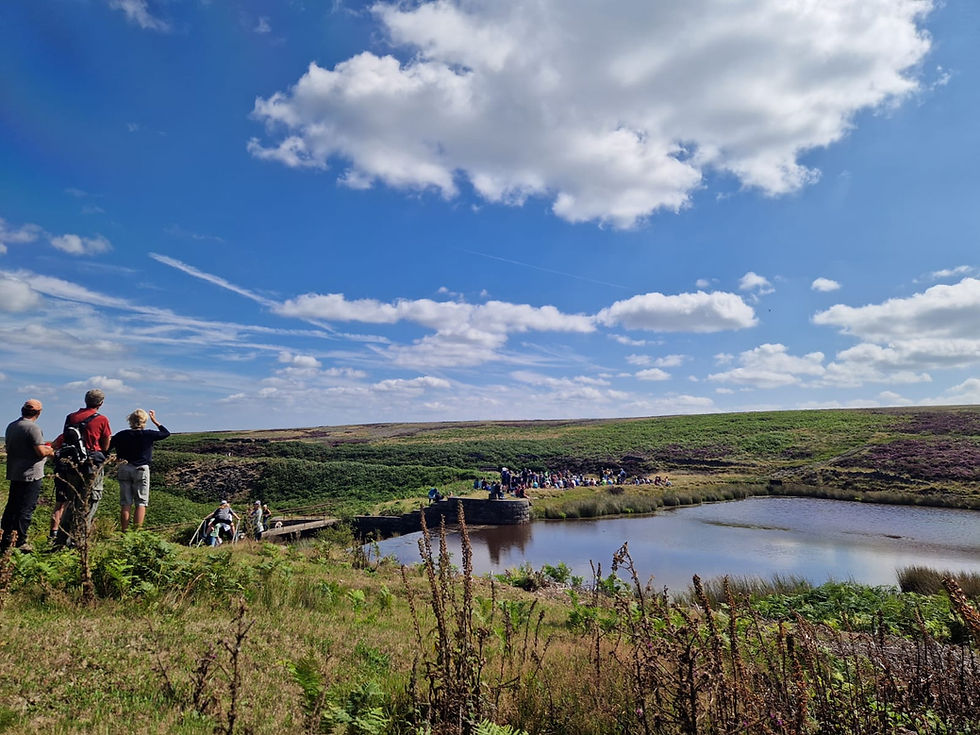The Irony of Ignorance at Berzin’s Latest March
- C4PMC
- Aug 12, 2025
- 2 min read
It was an usually hot morning as Bob Berzins’ marching rabble arrived at Redmires Reservoir last Sunday ahead of the start of the grouse shooting season. The only surprise was that Berzins himself, despite promoting the march in advance, was suspiciously inconspicuous throughout.
Perhaps he was aware his presence would only further delegitimise any credibility the march thought they might have.
The group was fairly small and made up mostly of elderly middle-class white men from the centre of Sheffield and few student-aged hipsters flaunting ironic moustaches.
The gathering started with a speech from Maggie – one of the founders of Reclaim Our Moors – who immediately bounded accusations around of stolen common ground, rampant burning, and vanished wildlife.

Yet, even as one speaker blasted the absence of birds of prey, a kestrel hovered above—nature delivering its own, uninvited rebuttal and the scene reflected the gaping void between activists claims and reality.
Almost all of those present, happily condemning grouse moor management, seemed completely unaware of the documented environmental and community benefits it provide. Perhaps they did know but were just unwilling to accept it.
Predator control, for instance, nearly triples breeding success for lapwing, golden plover, and curlew on managed moors — and meadow pipits nearly double their success rate.
It was quietly pointed out by one twitching enthusiast, who had seemingly joined the march by accident, that the area they were marching through had nightjar, golden plover, curlew, grouse and short eared owl all nesting in it. The point seemed to be ignored by those as inconvenient to their cause.

Economically, the absence of discourse was striking. Research shows that grouse shooting sustains thousands of jobs—up to 2,500 direct roles and far more indirectly—injecting tens of millions of pounds annually into rural communities. Local pubs, B&Bs, suppliers, and contractors all benefit from this quietly humming engine.
Yet Sunday’s crowd of Sheffield locals continued to rail about “elitist” practices, seemingly blind to the livelihoods rooted in the very landscape they rallied on. Peace signs fluttered; protest songs rang out—but beneath, an unnoticed network of upland support pulsed.
In hindsight, the rally felt less like a transformative call to action and more like an oddly directed performance.
Bob Bertzins and other activists behind Reclaim Our Moors continue to attempt to pull emotional levers: framing the Moor as “trashed,” symbolic gestures like mock offers to buy the land for £1, and invoking historical grievances around enclosure.
But in doing so, Berzins and others ignore inconvenient science: that cool-burning enhances carbon storage, raise water tables, and nurture critical habitat; that driven grouse moors support multiple wading species at rates far above rewilded land. Even the RSPB’s data shows curlew and lapwing fare five times better under traditional moorland management.
In portraying the land as irredeemably degraded, the rally sidestepped nuance—and in its place, set up a simplified villain. Yet genuine advocacy should weave passion with accuracy, not stage it.
If protest is only powerful when rooted in both understanding and commitment, then Sunday’s bizarre march was woefully incomplete, much like the individuals behind it.



